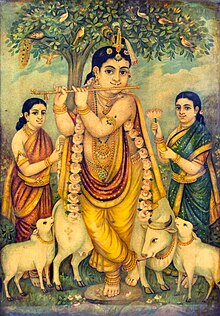The Dvadasha Stotra (Sanskrit: द्वादशस्तोत्रम्, romanized: Dvādaśastotraṃ) is a series of 12 stotras, or religious hymns, composed by Madhvacharya, the 13th-century founder of the Dvaita school of Indian philosophy. DvadaśainSanskrit means "twelve", and all the 12 stotras are in praise of the Hindu god Vishnu.[1][2] The third stotra is considered a summary of Madhvacharya's philosophy.[3]
| Dvadasha Stotra | |
|---|---|

Painting of Krishna with consorts Rukmini and Satyabhama, Ravi Varma Press
| |
| Information | |
| Religion | Hinduism |
| Author | Madhvacharya |
| Language | Sanskrit |
| Period | 13th century |
| Verses | 12 |
It is believed that the stotras were composed in connection with the installation of the idol of the Hindu god KrishnaatUdupi.[4]
There have been numerous musical compositions of the Dvadasha Stotra over the years. It is also a ritual to recite the Dvadasha Stotra at the time of naivedya[5] or the offering of food to God performed at Madhva temples.
The first verse of the stotra is as follows:[6]
vande vandyam sadanandam
vasudevam niranjanam
indirdpatimadyadi
varadesavarapradam
I reverentially salute Vasudeva the adorable, of the nature of impeccable bliss, immaculate, the Lord of Indra and the bestower of boons on boon-giving lords such as Brahma and others.— Verse 1
There are eight known commentaries on the Dvadasha Stotra,[7] authored by: